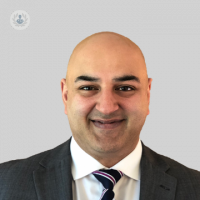Understanding knee pain in young adults
Escrito por:Knee problems are typically associated with the older generation, but knee pain is common in young people too – even as early as your 20s! We asked one of our leading orthopaedic surgeons Mr Feisal Shah to explain the commonest causes of knee pain in young adults and how it can be prevented.

What are some common causes of knee pain in young adults?
The common causes of knee pain in young adults are:
- Knock knees
- Bow leggedness
- Trauma
- Muscular imbalances
- Osteochondritis dissecans – the failure of fusion of the articular cartilage, which can sometimes settle with no surgery but may require keyhole surgery to fix the fragment.
- Ligament ruptures causing instability – damaging articular surfaces/meniscus.
What are some high-risk activities that can cause knee pain?
High-risk activities for knee pain include:
- Poor physical fitness
- Any activity change without a gradual increase in strength and control - e.g. going from a sedentary lifestyle to immediately trying to run 5km. The body needs to train in order to accomplish this safely and prevent injury in the knees.
- Not rehabilitating appropriately following injuries, and falling into a protective behaviour, which further weakens your knee.
- High impact exercise classes – e.g. body pump, body combat – particularly without training to perform.
Can osteoarthritis affect young people too?
Absolutely, particularly those who have had prior trauma, such as:
- Fractures around the knee joint
- Fractures in the thigh/shin bone that have not healed in the correct position
- Osteochondral fractures
- Patella mal-tracking/dislocations
- Genetics – family history
- Obesity
Which signs indicate the knee pain might be serious?
The following indicate that knee pain might be serious:
- Any knee pain that does not settle with rest
- Any knee pain that worsens at night
- Any knee pain that is associated with weight loss
- Knee pain with mechanical symptoms such as clicking/catching or locking of the knee
- Knee pain that involves instability such as giving way.
- Knee pain associated with swelling
- Knee pain associated with decreased range of motion.
Can knee pain be treated with conservative treatments?
Knee pain treatment really depends on the cause or diagnosis, for example:
- Osteoarthritis is best treated with weight loss, NSAIDs and low impact exercises, such as swimming, yoga, Pilates or cycling and walking.
- Newer injection preparations are promising in the management of the inflammation of osteoarthritis – I do not recommend stem cell/PRP as little evidence of efficacy.
The key is to establish an accurate diagnosis and then decide if conservative measures are indicated/wanted/appropriate.
When would surgery be necessary and which type of surgery?
For the treatment of osteoarthritis, surgery would be necessary:
- once conservative measures have failed or been exhausted.
- Once symptoms start to become intrusive and affect the quality of life then my feeling is surgery is indicated.
This can be in the form of partial or total knee replacements.
For the treatment of young adult knee pain, either of the following may be necessary:
- Osteotomy surgery
- Keyhole cartilage repair surgery
- Meniscal transplants
- Osteochondral transplant surgery
- Ligament reconstruction
What ways can young adults prevent knee problems when they are older?
My advice to patients would be:
- Ensure that they do not put on weight.
- Maintain a healthy lifestyle with regular exercise.
- Injury avoidance by always warming up.
- When fatigued to ensure that they take some rest.
- Correct equipment if applicable.
- Seeking medical advice if they are running into problems.
Book an appointment with Mr Shah via his Top Doctor’s profile here, today!


